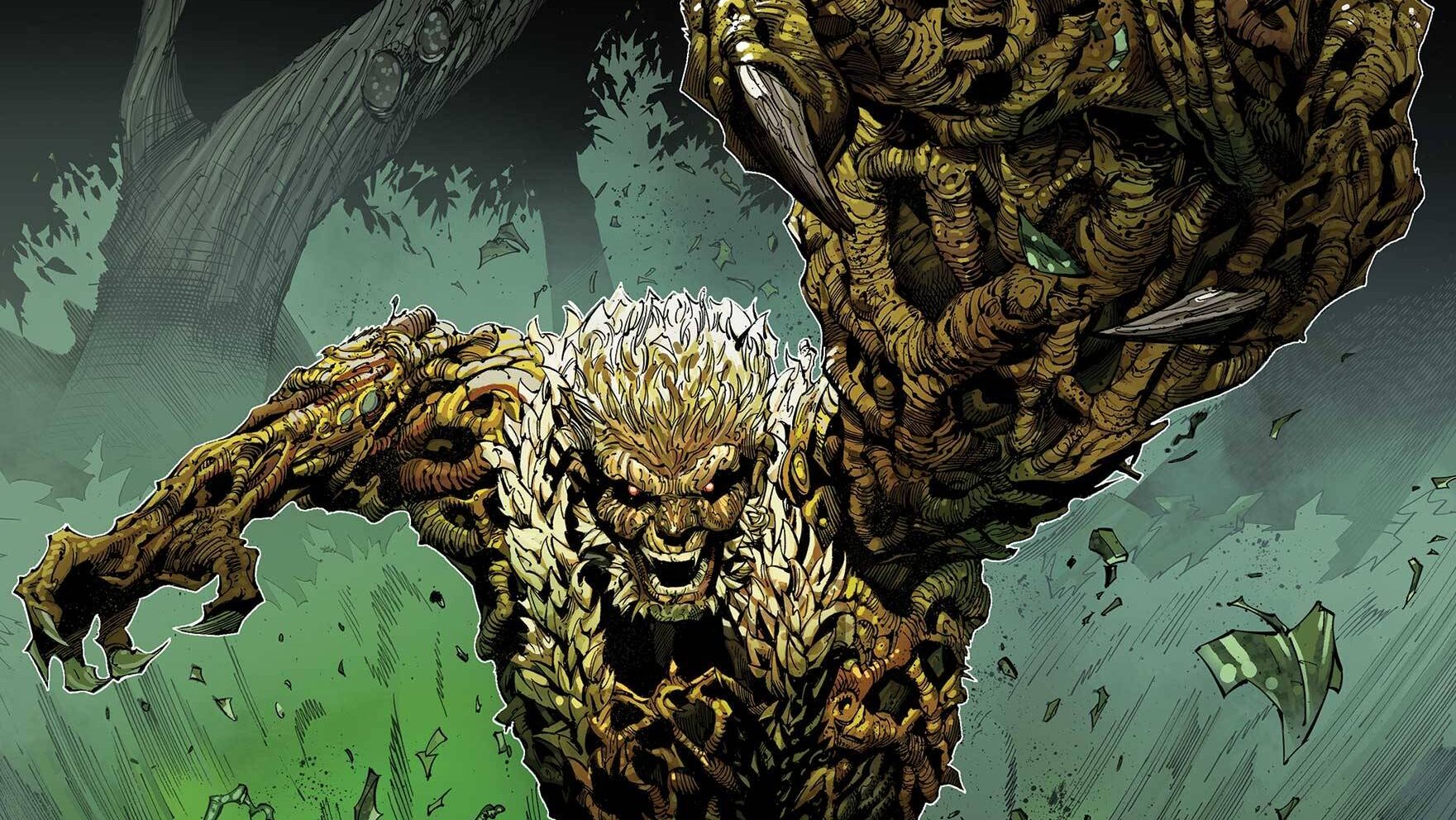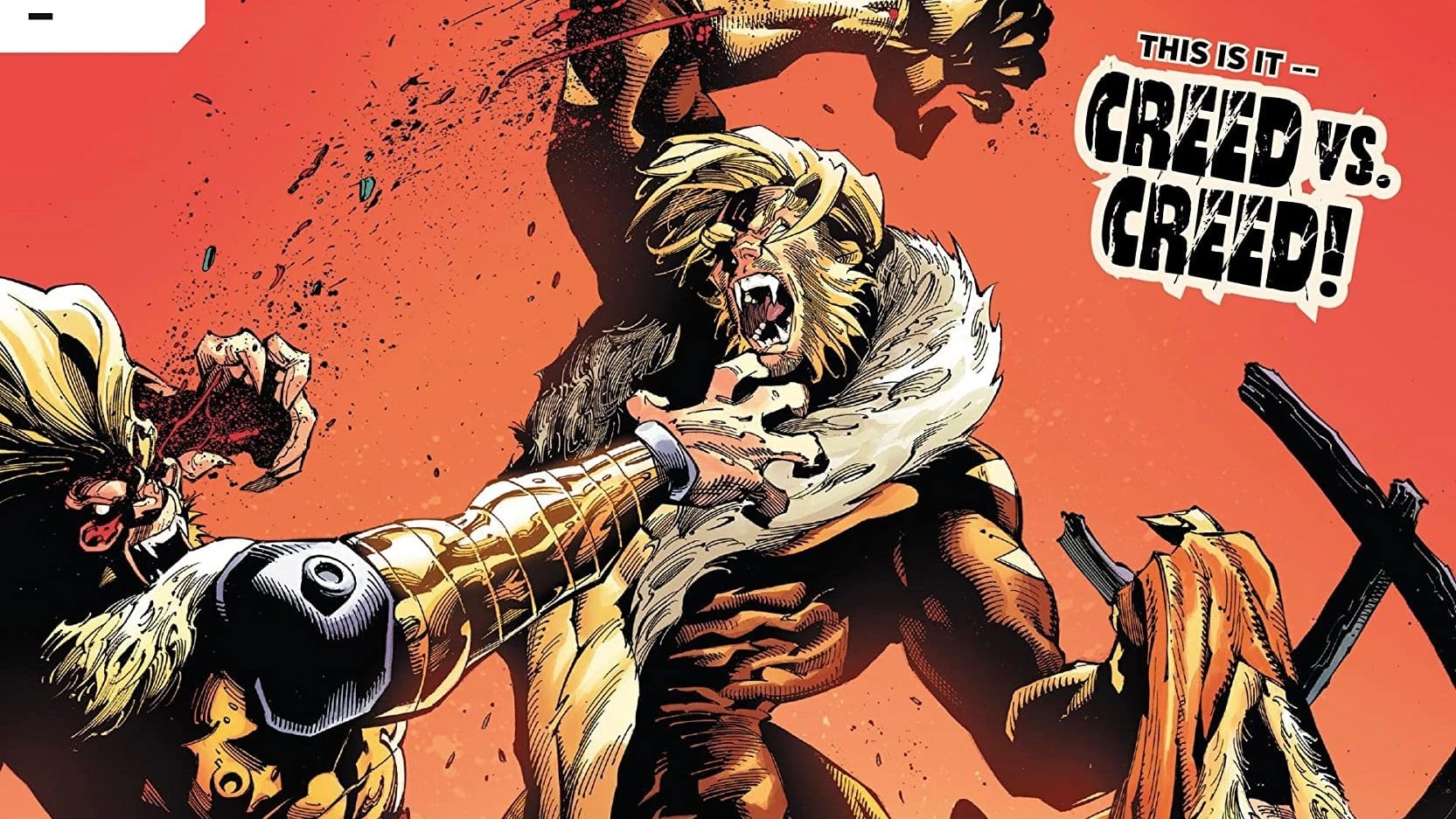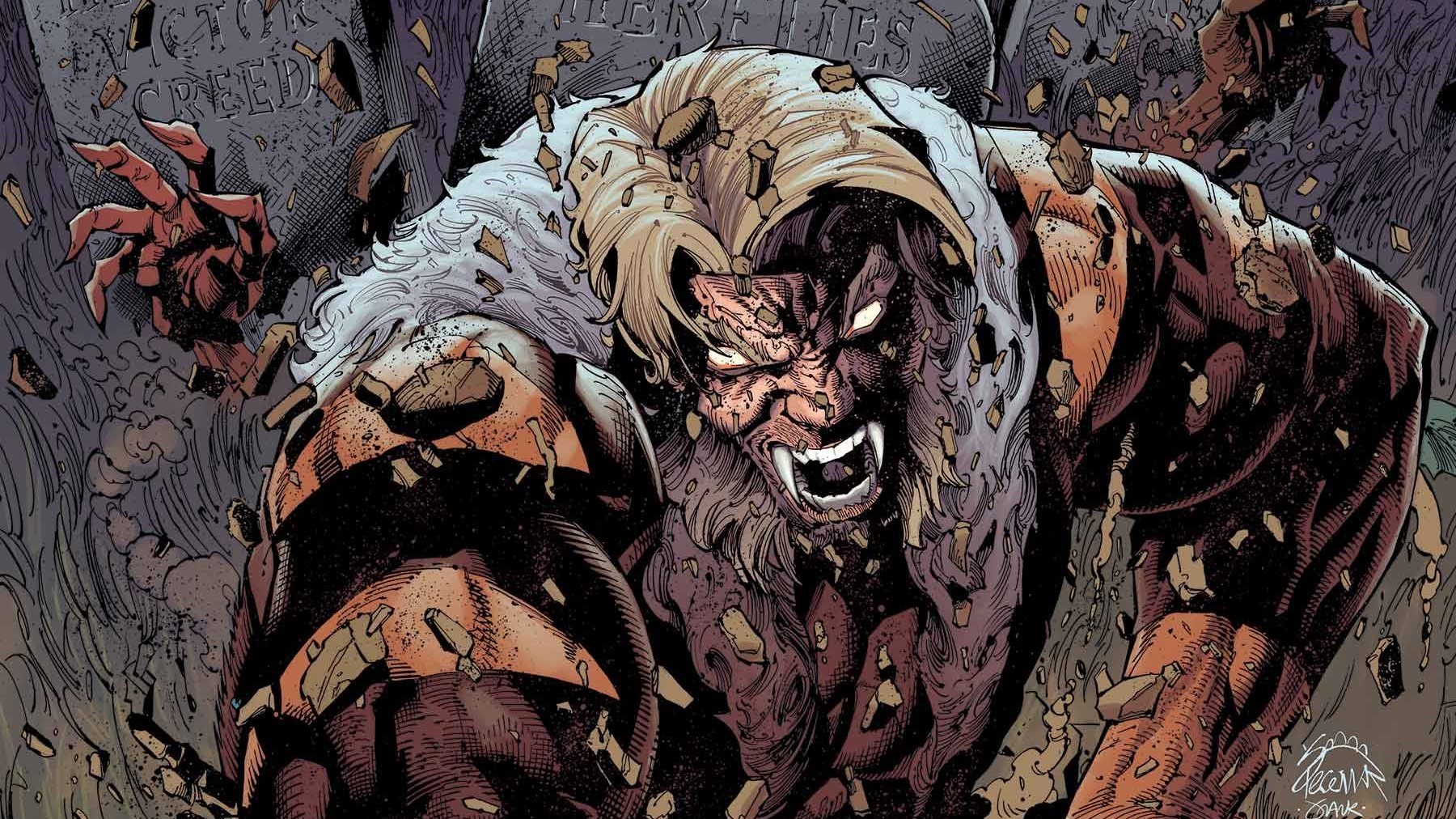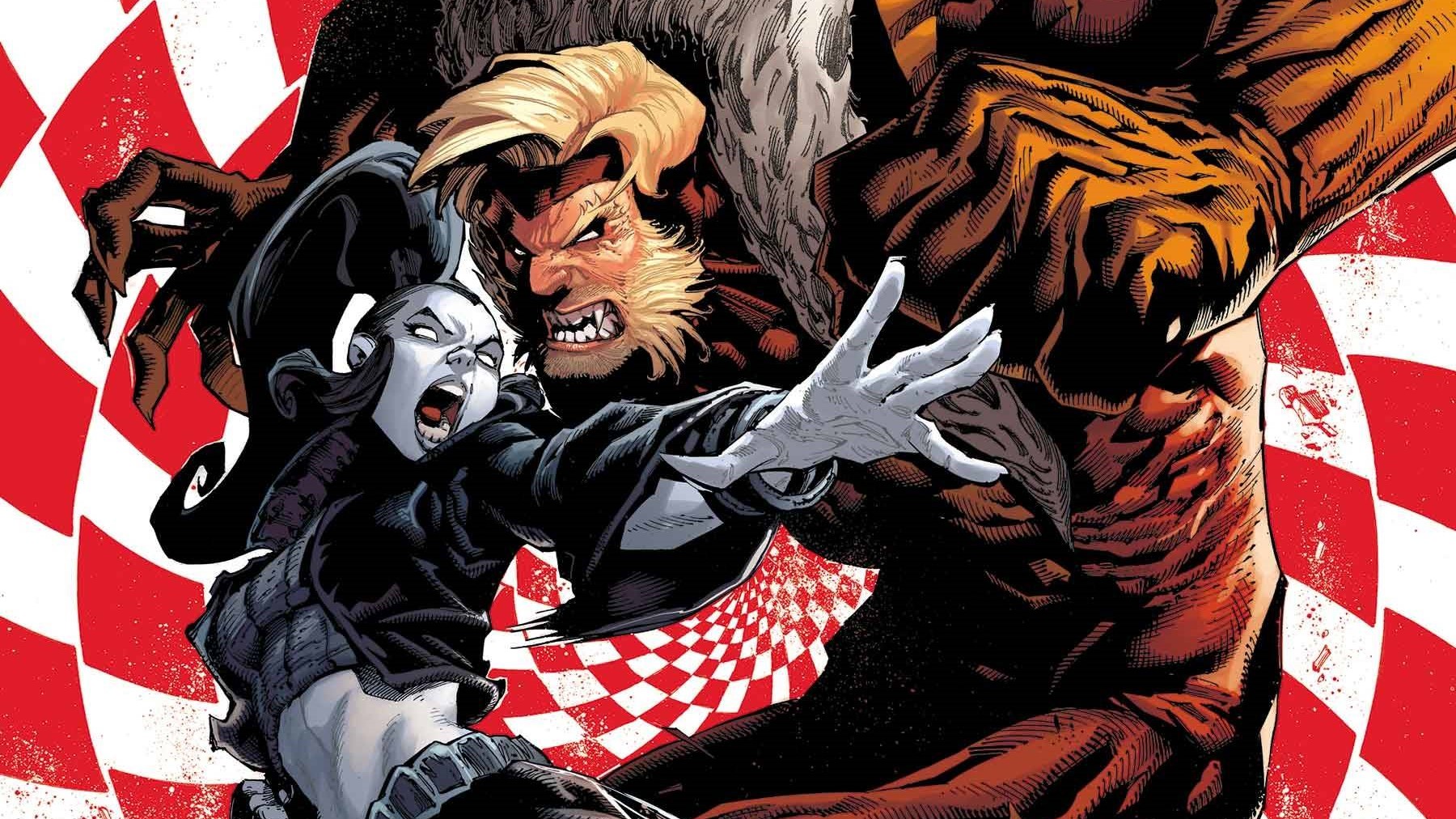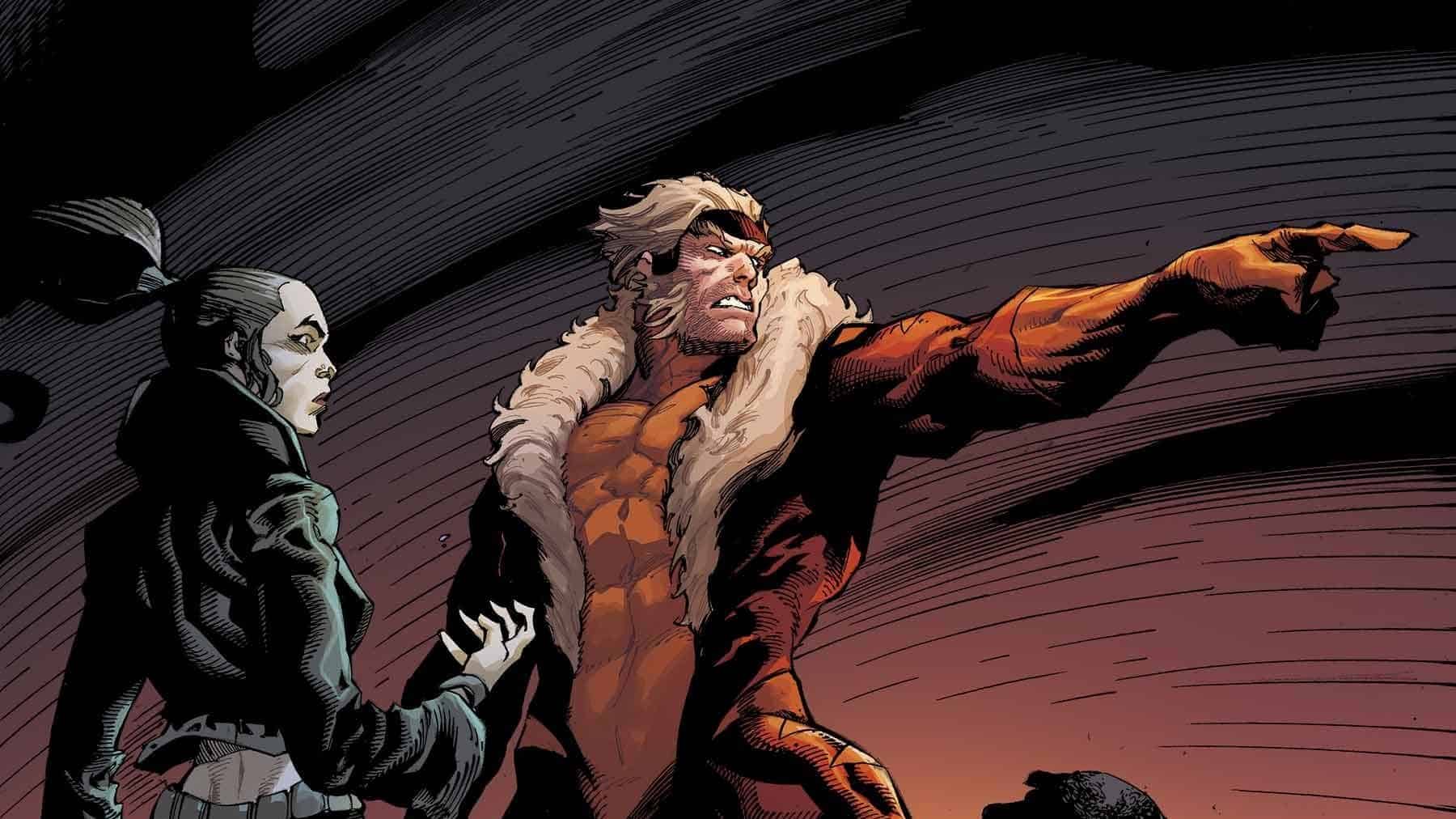Feral Councils are quiet, Quiet Councils are feral, and Victor Creed hosts a fireside chat in our latest journey through the carceral state of Krakoa. Sabretooth #4 was written by Victor LaValle, penciled by Leonard Kirk, inked by Craig Yeung, colored by Rain Beredo, and lettered by VC’s Cory Petit.
Jude Jones: Abortion is now illegal in the United States of America. Kinda. In many states, more than half of the population lost the right to choose how to care for their bodies. In others, those choices have been expanded and defended to counterbalance the actions of neighboring states. The patchwork legality of this procedure is proof positive that one act, viewed through different prisms by different people, can lead to conflicting consequences. Your act might yield congratulations and support. Or you might be charged with murder and thrown under a sentient island nation.
It’s not about the act, then. It’s never been about the act. It’s about being the right kind of person, because the right kind of person can get away with genocide and find themselves embraced.
Our team of outcasts has done nothing different than others on the island: Lust. Kill. Scare. Love. Why, then, are they punished and others not?
Sabretooth #4 is all about that “why.”
Some secrets about our team and their tribulations are revealed here. And while there’s still one issue left, there’s more than enough here to celebrate over.
Anna Peppard: It’s fitting that you opened this review with the fall of Roe v. Wade, because I definitely want to talk about that in relation to this comic. But we’ll get to it. First, let’s talk about something writers love to talk about. I am, of course, talking about talking about writing.
Regrets

Jude: Victor LaValle is a writer. I don’t mean that as a description of what he does; I mean that as a compliment of the highest order. He is a writer who is writing his ass off. The opening salvo featuring Third Eye finally lets us in on his power set (astral plane traversal), his motivations (be better than the dad who taught him how to use his powers for harm), and his actions (saving the crew from psychic death via Melter shocking Sabretooth’s mind and body). This could have been done in exposition style, or flashback style. Instead, the storyteller–and make no mistake, this is as much his story as it is Sabretooth’s–uses an economy of words (and Leonard Kirk’s fantastic art) to, in two pages, tell an invigorating backstory while keeping us abreast of our characters’ progress.
This is the good shit.
Anna: I really liked the multifaceted imagery that’s used for this opening scene with Third Eye. The golden organic cords that bind Nekra, Oya, Madison, and Melter to Third Eye also bind him to them. Sort of like the symbiotic relationship between writers and readers. (Am I being too academic? Probably. Comes with the territory!) It also evokes both rescue and, potentially, manipulation, by emphasizing the vulnerability of the mutants Third Eye is rescuing. Third Eye holds his fellow exiles’ minds in his hands with authority–from on high–but also somewhat casually, like a trawling fisherman. While revealing important elements of Third Eye’s backstory, this opening scene, and this comic as a whole, also maintains plenty of intriguing mystery about his powers and motivations.
Jude: And the good shit doesn’t stop. Literally every panel is dripping with substantive thought or innuendo. Bling! is relying on little more than blind faith (and Shark Girl) to find the bodies of her friends. But who else would search tirelessly for Black women than, well, a Black woman?
Skin and Fred Dukes (shave the mustache bro) share a brotherly bond over how the island nation with so much promise is slowly falling apart. This, of course, seems obvious to anyone who’s read the X books since Krakoa’s inception–a lot has happened (Swords, Russian doll assassins, that alien plant invasion, etc.), but rarely do we hear anyone directly acknowledge that *all of this* is happening damn near at once. It’s one thing to see a lot–it’s another to *want* to see more. Skin and Blob, I think, are getting to the point where they’ve seen enough; how many other mutants are ready to follow?
Anna: If I have a central complaint about the Krakoa era (besides the way it’s handled reproductive rights–again, we’ll get to it), it’s that the Jonathan Hickman-led drive for big ideas and status quo shake-ups hasn’t always left enough room for the kind of quiet, domestic character interactions that are my favorite thing about X-Men comics. But this series keeps on giving me what I love–characters who pause amid the chaos to contemplate it, talking about resurrections and transformations and time travel and multiple universes and functioning as reader surrogates in the process. Because when Skin and Blob talk about all the wild stuff that’s happened to them over the years, they’re also talking about the experience of reading X-Men comics. These characters have been through a lot, and so have the people who read their adventures, whether they’ve been reading for a few weeks, a few years, or several decades. From one perspective, X-Men continuity and its vast stable of characters is a loadstone, limiting the accessibility of this storyworld and what you can do with it. From another perspective, it’s a source of endless wonder and possibility. LaValle and Kirk’s cliff convos, which evoke classic issues of Chris Claremont-era Uncanny X-Men and feature characters contemplating vast vistas while discussing the past, gesture more toward the latter.
I also wanted to signpost that line about brotherhood. Says Fred, “When there’s a sudden power vacuum, it’s good to have friends. A Brotherhood.” Note that Brotherhood is capitalized. Maybe this is foreshadowing something nefarious. Or maybe it’s gesturing toward the social inequities that have often existed between the X-Men, who are generally human-passing mutants protected by a rich white savior, and their mutant enemies, some of whom have, historically, been less able to pass for human and/or lacked the X-Men’s access to institutional wealth and power. We’ll see. But also, as my writing partner has previously explained, Magneto is not Malcolm X. I’m sure LaValle knows this, and won’t be settling for that analogy.
Love don’t live here anymore

Jude: Third Eye’s description of Sabretooth’s familiarity with death–it’s happened so often that he’s developed a mental response to deal–wasn’t surprising. He, like the funhouse mirror of himself, is almost unkillable. Enough time will slow the body to heal, if the mind can hold on to something long enough to wait out the healing.
And what does Sabretooth hold on to? The memory of a blood-soaked gun and a dead bird.
Excuse me, a dead Birdy.
I’ve been wondering when his former partner, whose power was, essentially, to calm his murderous rages and provide clarity, would show. (Fun fact: she was only around for about a year!) And while LaValle pairs that image of a dead bird with the phrase “needing someone isn’t the same as loving someone,” I would argue the anguish in the next panel betrays that narrative. Sabretooth’s safe space is the memory of his partner, and if the mere memory of someone who helped you be your best self is what keeps you alive isn’t love, then I don’t know what is. Maybe the love brought him back. Or maybe the pain from losing this love, this need, shocked him back to life.
(Ok, fine, maybe this isn’t love because love should be reciprocal and I’m 100% sure Sabretooth didn’t, couldn’t, and wouldn’t reciprocate properly. But does that make him a monster or a man? Or is there a difference? Maybe that’s a thesis of this work? I digress.)
In any case, Sabretooth, saved, is now proficient at manifesting on the island. He spies on Mole as Mole relays the story of Sabretooth’s manifestations to a cynical Magma.
Mole reminds me of, well, me as I read this. His words align exactly with what I’ve been saying this whole time–Sabretooth is a bad person, but on an island full of worse people (and “better” people) who’ve done worse things, his imprisonment doesn’t just feel wrong, it is wrong.
And, like me, Mole feels the spirit of Sabretooth around the corner. Though he’s inspired to help, he’s also well aware that helping the devil will likely get you burned.
But help the devil anyway.
Anna: I don’t think all men are monsters or that all monsters are bad. But I was happy that this comic didn’t overly romanticize Victor’s relationship with Birdy. In superhero comics, women often die and stay dead to make men feel feelings. It’s good to see that acknowledged here. I also want to make sure readers are aware of this perfect sentence from Birdy’s character bio on the Marvel wiki. Under “Abilities,” we’re told she is, “Able to operate a number of firearms, most of which were bigger than she.” Poetry.
Take, eat: this is my body; which is broken for you: do this in remembrance of me

Jude: I’ve called him the devil, but it’s clear Sabretooth sees himself differently. As something tragic, righteous… sanctified. His personality was split into three: the father, the son, and an unholy spirit; he’s been wrongly accused and killed; he’s been dragged down to hell. He is looking for resurrection, and taking all those other damned souls with him.
If you’d told me “Sabretooth as Christ” for a comic pitch, I might have pitched a brick covered in holy water at you.
And yet, LaValle isn’t just making this comparison logical (which in itself would be masterful), he’s making this comparison feel reasonable.
One of my favorite graphic novels is a work called Judas by Jeff Loveness and Jakub Rebelka. In it, the tale of the Resurrection is told from the perspective of its villain. And while I won’t ruin the story for you, I will say this framing narrative–viewing history from the perspective of the damned–is a beautifully unnerving revelation.
This is just great work all around.
Anna: I continue to enjoy the way this series walks a tightrope regarding the sympathetic-ness of Victor Creed. The revelation in this issue that Victor Prime (or whatever we want to call him) wasn’t previously aware of the Feral Council adds another degree of difficulty to this high-wire act. To what degree was Sabretooth responsible for any of what’s been going on in the Pit if he doesn’t know his own mind? Yet he appears very willing to work with the Feral Council to further aims that cannot possibly be wholly altruistic. He remains a bad guy, but a complicated one, as all bad guys should be in stories that want to do more than stage black-and-white morality plays.
Jude: As they’re gathered in Sabretooth’s manifestation of his childhood house, our characters, saved by Third Eye and summoned by Sabretooth, reflect on how family–the embrace of or the rejection by–have shaped them. Nekra’s story is important. Her origins are racist, full stop: her retelling of her story is a succinct, powerful necessary reclamation.
And of reclamation, the piece de resistance of maybe the entire series occurs on two adjoining pages–two monologues, one in panel form and one as a data page.
Sabretooth’s monologue–that Krakoa sacrificed its promise when they put him in the Pit–is pitch-perfect. Sabretooth the character may be irrevocably flawed, but his flaws do not absolve the flawed logic of his imprisoners.
And of Third Eye’s masterfully written data page? It’s perfect. Yes, it’s exposition, but it’s beautiful, necessary exposition–not just “what” but why. Nekra and Oya were imprisoned for saving the island without an X-Force license; Melter, for having the audacity of aspirations to govern the land he rests on. Madison was imprisoned for loving the wrong kind of person, prescient given the imagery he emerged from the pit in last issue. This person, Danger (the physical manifestation of the Shi’ar upgraded Danger Room), was rejected by the island and its leaders (note: Charles really, really, sucks at being a father figure, my God); Madison, because he had the audacity to love the rejected, is now jailed. (And where is Danger you ask? Have you read Wolverine lately?)
And of Third Eye? Our semi-reliable and always interesting narrator? The *other* main character of this work? Well, remember all those babies created in Way of X? Babies that were born out of wanton lust and then just given up for some sort of adoption? Well, Third Eye’s connection to the astral plane means he can see life paths and futures, including the futures of these uncared-for babies. He shared the vision of these children’s future suffering–if they were born and discarded–to the island.
The island stopped having babies.
Third Eye’s crime was giving the people a conscience, giving them guilt so they would not create kids they wouldn’t care for.
I am writing this on June 27th, 2022. Three days ago, Roe v. Wade was overturned, effectively ending abortion in predominantly southern, poor, Black states. States that already had problems taking care of their living citizens. States that view institutional kindness as a sin, often leaving governments little more than a pittance to care for the health and education of their children. And a reminder about those real-life children, those abandoned or given up, waiting to be adopted: there are hundreds of thousands of them, and the most needy are, of course, the last taken.
A comic parroting the idea that maybe some births shouldn’t happen would be provocative in simpler times. These are clearly not simpler times. Anna, I know you have strong thoughts about those “discarded” babies. Care to share?
Anna: If you’ve read my previous writing about Krakoa-era X-Men comics, you’ll know I’ve been disappointed with how issues related to reproductive rights have been handled in this storyworld. Even when a recent data page in Legion of X #1 tried to clarify that Krakoa no longer enforces “compulsory reproduction,” it raised more questions than it answered. What did “compulsory reproduction” involve, how was it “enforced,” and can someone just say birth control and abortion are legal on Krakoa? Please? Pretty please? With a cherry on top? My disappointment is, inevitably, inseparable from real-world events, namely the gutting of reproductive rights for so many Americans. In the context of this–yeah, I’ve got feelings about the reference to “Make More Mutants” in Third Eye’s data page.
On the one hand, I see the pointed critique you’re identifying of Krakoa’s first law and the suffering it would inevitably cause, similar to the suffering restrictive abortion laws are already causing in the United States. Apparently, Third Eye was sent to the Pit for interfering with Krakoa’s domestic supply of infants. On the other hand, I found Third Eye’s emphasis on mutants carelessly abandoning their newborn babies uncomfortable in ways that may not be entirely productive. In real life, it’s exceedingly rare for anyone who carries a baby to term inside their body not to feel attached to that baby. But careless abandonment is a central feature of misogynistic caricatures of so-called “late-term abortions,” which typically present women as selfish harlots tossing aside viable babies. These caricatures are gross distortions of reality; abortions performed after 21 weeks almost always happen to protect the health of the pregnant person or because they lack proper access to reproductive healthcare or material support.
To be clear: I don’t think LaValle is supporting this caricature. The history of reproductive rights in the United States is deeply intertwined with both gender politics and racial politics and I am certain LaValle knows this. It’s also important to keep in mind this is Third Eye speaking, not LaValle, and that Krakoa’s larger issues with reproductive rights aren’t LaValle’s purview; he’s working within the world he was given. But I also think we’re living in a cultural moment where it’s risky to court ambiguity when discussing these things. Lack of access to sex education and birth control isn’t an issue of personal responsibility; it’s an institutional problem.
Jude: AMEN
Anna: I wish that point was made a little clearer here, if only because too many people don’t understand it. And if we’re going to talk about carelessness, I continue to be more concerned about the careless way this storyworld has treated the mutants who gave up their babies (or endured unwanted pregnancies?), none of whom have ever appeared on panel or uttered a line of dialogue. That abandonment weighs on me, and should be weighing on other mutants.
Jude: I agree wholeheartedly with Anna’s sentiments. I’ll only add that this lack of agency and voice was the exact issue I had with Lost’s portrayal in Way of X. It’s frustrating to see people, who can and should talk for themselves, be talked around–especially when these people are traditionally marginalized.
Returning to the story–we still have no idea what kind of deal Sabretooth struck with Doug; we only know that Sabretooth broke the agreement, ostensibly threatening to tear down the island.
Thus we see Victor rising from the dead, (He. Is. Risen.) ready to cause a ruckus. Will his team of disciples follow? Has imprisonment only made Victor worse?
Anna: The “he is risen” scene feels like one of those things you might come up with as a moment you definitely want in a story before knowing exactly how you’re going to get there, but the moment’s so good, you have to find a way. And it’s worth it. It’s a great cliffhanger climax–thematically meaningfully and superheroically bombastic.
Jude: Is Victor even really free, or is he, like a scene from Inception, just breaking through to another level of his eternal dream?
Only one more issue to find out.
X-Traneous Musings:
- The passage of time here, reflected by the X Lives/Deaths of Wolverine-inspired scene, means that we should be just about caught up with the current timeline of events.
- Victor LaValle’s ability to write Blackness is beautiful. The tone-appropriate use of “sis” and “your boy”; the reference to hoppin ‘John and hanging with cousins; the fact that only Bling! is concerned with finding the “missing” Black women. Unlike some writers who try too hard to translate culturally Black language to paper (Reggie Hudlin in Icon and Rocket) or those who seem to have outright disdain for it (Christopher Priest in Black Adam), LaValle integrates this blackness in a holistic, natural way. Writers of color, please take note.
- Our friend Armaan noted the quote “Could they find a new way to deal with someone like me” will stick with him for a while. Me too, friend. Me too.
- And of Nekra: her origin story implies that she was ostracized from Black folk because of her white skin. But this was clearly a white writer projecting a false equivalence on a culture they do not understand. Light-skinned Black folk–and albino Black folk–are common. And while they’re teased, sure, they’re also embraced and loved. This is why LaValle noting that Nekra was embraced by family, lovingly, is important. Her community wouldn’t have been oblivious to her condition, but it wouldn’t have ostracized her to the degree her origin would imply, either. (Anna: So much “yes” to all of this.)
- This is Ida B. Wells. This is not. You’re welcome.
A few resources to share at your discretion:
- https://www.wired.com/story/guide-abortion-resources-post-roe-america/
- https://abortionfunds.org/need-abortion/
- https://www.plannedparenthood.org/learn/abortion
- https://womenshealthclinic.org/what-we-do/abortion/abortion-resources/
- https://prochoice.org/

